Overview
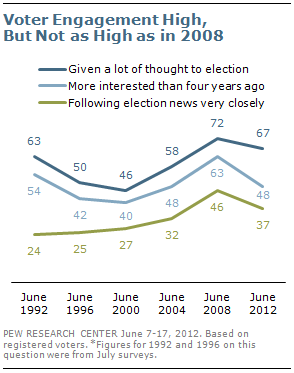
Less than five months before Election Day, voters are not as engaged with the presidential campaign as they were at this point four years ago, when interest in the campaign reached record levels. But voter engagement today generally equals or surpasses levels from the four campaigns prior to 2008, indicating that 2012 could be another relatively high turnout election.
Two-thirds of registered voters say they are giving quite a lot of thought to the election, which is down slightly from 2008 but higher than in any campaign from 1992 through 2004. Interest in election news, also lower than four years ago, surpasses interest in all other campaigns since 1992.
The percentage of registered voters who say they are more interested in politics than they were four years ago, which hit an all-time high in June 2008, is down sharply since then. Even so, the 48% who say they are now more interested in politics is identical to the number saying this in 2004 – and higher than the numbers expressing comparatively greater interest in politics than in 2000 and 1996.
The latest national survey by the Pew Research Center for the People & the Press, conducted June 7-17 among 2,013 adults, including 1,563 registered voters, finds that the contest between Barack Obama and Mitt Romney is shaping up to be a close one. Not only is the horserace nearly even – 50% of registered voters currently support Obama or lean toward him, while 46% support or lean toward Romney – but each party holds distinctly different advantages.
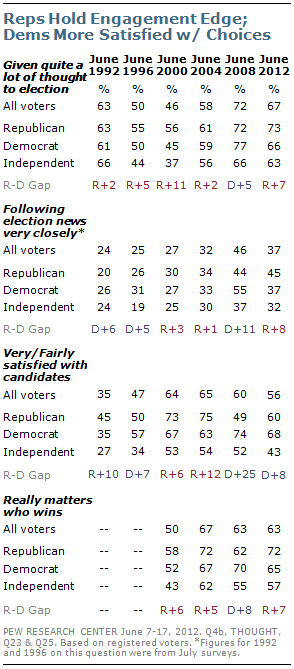
Republicans hold the edge on several turnout measures, in contrast to 2008 when Democrats had leads – some quite substantial – on nearly every indicator. More Republican voters than Democratic voters are giving quite a lot of thought to the election (73% of Republicans vs. 66% of Democrats) and paying very close attention to election news (45% vs. 37%). In 2008, Democrats held leads on both interest measures, the first time that had occurred in campaigns dating to 1992.
Moreover, GOP voters are more likely than Democrats to say it really matters who wins the 2012 election (72% vs. 65%). Four years ago, Democrats were more likely than Republicans to say it really mattered who prevailed.
Yet Democrats are more enthusiastic about their candidate. Most Obama backers support him strongly, while most Romney voters support him only moderately. Similarly, Democrats are more satisfied with the choice of candidates than are Republicans: 68% of Democratic voters say they are satisfied with the field compared with 60% of Republican voters. This is a smaller gap than at this point in 2008, when 74% of Democrats and just 49% of Republicans were satisfied with the field. However, the GOP led in candidate satisfaction during both of George W. Bush’s successful campaigns in 2000 and 2004.
Presidential Horserace Narrows
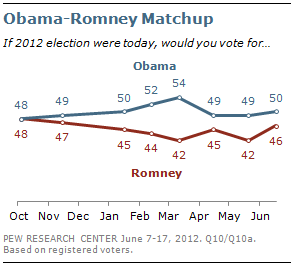
Voter preferences are more closely divided between Obama and Romney than they were in May, when Obama led Romney by seven points (49% to 42%). Currently, 50% favor Obama while 46% back Romney. Yet it is notable that in eight general election matchups since last October, Romney has never led Obama.
And Obama’s strong support nearly doubles Romney’s – 30% of registered voters back him strongly compared with just 17% who support Romney strongly. Obama’s advantage in strong support is about as large today as it was over John McCain in June 2008 (28% to 14%).
However, Romney’s deficit in strong support does not appear to be hurting him. While Romney’s supporters are less positive about him, they are as committed to vote for him as Obama

voters are committed to vote for the president. This may reflect the fact that more Republicans than Democrats say it really matters who wins the election. Fully 91% of Romney supporters have an unfavorable opinion of Barack Obama, with 53% offering a very unfavorable assessment.
Romney Leads on Economy
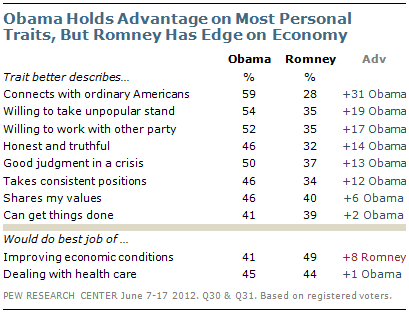
Romney’s recent gains in the horserace have come during a period when more Americans reported hearing bad news about the economy. The current survey finds that views of national economic conditions remain abysmal. Perhaps more important, the percentage saying they expect conditions to improve over the next year has fallen 1o points, from 44% to 34%, since March.
The slide in economic optimism points to Romney’s most important advantage in the race. Nearly half of registered voters (49%) say Romney would do the best job of improving economic conditions, compared with 41% who favor Obama.
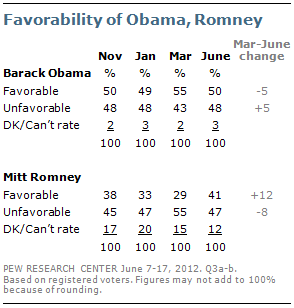
Yet Romney trails Obama by wide margins on connecting well with ordinary people, honesty and truthfulness, consistency, displaying good judgment and several other personal dimensions.
Romney’s personal favorability has risen by 12 points since March – from just 29% then to 41% today. Still, more voters have an unfavorable opinion of Romney than a favorable view (47% vs. 41%). No previous candidate in the past 20 years has been viewed more unfavorably than favorably at this point in the campaign cycle.
While Obama’s image has slipped modestly since March it remains more positive than Romney’s. Half of voters have a favorable opinion of Obama (50%) and about the same percentage has an unfavorable view (48%).
Other Findings: Fall Predictions, Views of Ann Romney
- Obama Still Favored to Win. About half of registered voters (52%) say Obama is most likely to win in November, while just 34% expect Romney to win. In March, 59% said Obama was most likely to win. Even many Romney supporters have doubts about his chances – 37% say either that Obama is most likely to win (21%), or have no opinion (16%).

Just 19% of Obama supporters expect a Romney victory or have no opinion.
- Younger Voters Less Engaged. Younger voters’ engagement in politics, which rose sharply in 2008, has declined. Among voters younger than 50, 60% say they are giving quite a lot of thought to the election, down from 71% in 2008. There has been no change among voters 50 and older.
- Black Engagement Remains High. Engagement among black voters, which also increased in 2008, remains high. About seven-in-ten black voters (71%) say they are giving quite a lot of thought to the election and 54% are following campaign news very closely. Both measures are little changed from 2008.
- Ann Romney Not Well Known. About half of voters (54%) have no opinion of Ann Romney. Three-in-ten (30%) view her favorably while 17% view her unfavorably.




